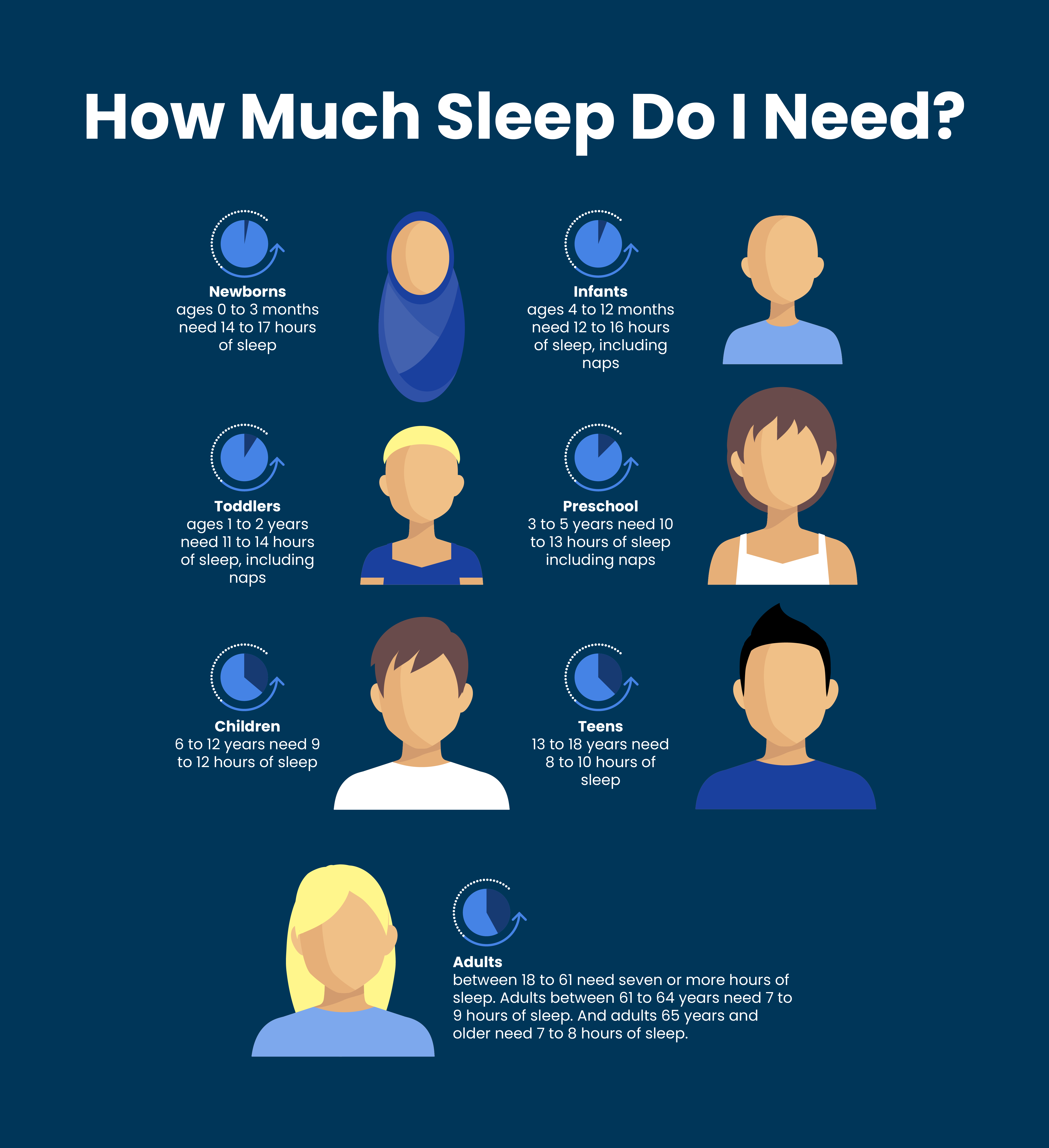How much sleep do you need? This question is not only fundamental to our daily functioning but also integral to our overall sleep health. The optimal sleep duration varies significantly between individuals, often influenced by genetic makeup, lifestyle, and personal health. For adults, experts typically recommend around 7 to 9 hours of sleep per night to ensure adequate rest and recovery. Understanding the effects of sleep deprivation is crucial, as insufficient sleep can lead to a myriad of health issues, highlighting the importance of sleep in maintaining both physical and mental well-being.
When considering our nightly rest, many people wonder about their personal sleep requirements and how that aligns with standard recommendations. Adequate sleep is crucial for rejuvenation and affects cognitive performance, mood regulation, and even physical health. One’s need for rest may fluctuate based on various factors, including stress levels, age, and general wellness. Exploring sleep health tips can provide strategies for achieving deeper, more restorative sleep, while learning how to improve sleep quality is paramount for those struggling with insomnia or restless nights. Ultimately, the significance of proper sleep cannot be overstated—it is a cornerstone of a healthy lifestyle.
Understanding How Much Sleep Do You Need
Determining how much sleep you need can be as simple as observing your own body. Many experts suggest experimenting with sleep duration by allowing yourself to wake up naturally, without the interference of alarms or external prompts. This method can give you a clearer insight into your individual sleep requirements. Ideally, after a few nights of testing, you would find a consistent duration during which you feel restored and energized upon waking. For most adults, this optimal sleep duration ranges from 7 to 9 hours per night, but it can vary depending on factors like age, lifestyle, and overall health.
Understanding your unique sleep patterns is crucial, as insufficient rest can lead to various health issues. Individuals often underestimate the importance of quality sleep, which is why adhering to a routine that prioritizes consistent bedtimes can foster better sleep health. Furthermore, your daily activities, stress levels, and evening habits can influence your ability to achieve the necessary rest, highlighting the significance of tailoring your environment and lifestyle to support proper sleep hygiene.
The Importance of Sleep and Sleep Health Tips
Sleep is vital for numerous bodily functions, affecting everything from metabolism to cognitive performance. Lack of adequate rest can gravely impact your physical and mental health, increasing the risks of diseases such as obesity, heart disease, and depression. Therefore, prioritizing sleep should be a fundamental aspect of your health regimen. Engaging in relaxing activities before bedtime and creating a sleep-conducive environment—such as maintaining a cool and dark room—are essential tips for improving your sleep health.
Incorporating consistent sleep schedules is another critical strategy for optimizing sleep duration. By going to bed and waking up at the same time daily, you help regulate your body’s internal clock, making it more intuitive for your brain to recognize when it’s time to sleep. Additionally, limiting screen time before bed can reduce sleep-disrupting blue light exposure, promoting higher-quality slumber.
Effects of Sleep Deprivation on Health
Sleep deprivation can have far-reaching effects on both cognitive performance and physical health. When individuals don’t get enough rest, they may experience diminished focus, memory problems, and irritability. Over time, chronic sleep deprivation can elevate the risk of developing serious health issues like diabetes, hypertension, and cardiovascular disease. Understanding these consequences underlines the necessity of maintaining a healthy sleep routine.
Moreover, sleep deprivation can disrupt hormonal balance, leading to issues such as weight gain and increased anxiety levels. It’s essential to recognize the signs of inadequate sleep and seek ways to mitigate the associated risks, such as refining evening rituals or consulting with healthcare providers for persistent sleep issues. The message is clear: ensuring adequate sleep is not merely beneficial; it’s essential for maintaining overall well-being.
How to Improve Sleep Quality Naturally
Improving sleep quality often requires adopting several natural strategies. Firstly, creating a calming bedtime routine can signal to your body that it’s time to wind down. Incorporating activities like reading, meditating, or practicing gentle yoga can help ease the transition to sleep. Additionally, monitoring your diet and avoiding heavy meals or stimulants before bed is crucial. Consuming caffeine late in the day or eating rich foods can disrupt your ability to fall asleep, emphasizing the importance of mindful eating.
Another key element to enhancing sleep quality is the optimization of your sleep environment. This includes managing noise levels, controlling room temperature, and investing in comfortable bedding. Implementing blackout curtains can create a dark environment essential for melatonin production. Furthermore, establishing a consistent sleep schedule is vital to reinforce your body’s natural circadian rhythm, leading to improved sleep quality over time.
Cognitive Behavioral Therapy for Insomnia
Cognitive Behavioral Therapy (CBT) has emerged as a leading treatment for insomnia, especially for those seeking long-term solutions rather than temporary fixes. This therapeutic approach focuses on identifying and altering the thoughts and behaviors that contribute to sleeping difficulties. By working with a qualified therapist, patients can learn strategies to overcome negative sleep patterns and promote healthier sleep habits.
The benefits of CBT extend beyond immediate improvements in sleep quality; they often lead to lasting changes in how individuals view and approach sleep. This method has been shown to reduce nighttime awakenings and improve overall satisfaction with sleep. Unlike medications, which can lead to dependency, CBT equips individuals with the tools necessary to manage their sleep health independently.
Common Sleep Disorders and Seeking Help
Understanding common sleep disorders is crucial for anyone struggling to achieve restful sleep. Conditions such as sleep apnea, narcolepsy, and insomnia can significantly impact sleep quality and overall health. Symptoms of these disorders can include snoring, excessive daytime sleepiness, and difficulty staying asleep throughout the night. Recognizing these signs early on is essential for seeking appropriate treatment and ensuring long-term health.
Don’t hesitate to consult with a sleep specialist if you suspect you have a sleep disorder. They can provide tailored assessments to help uncover any underlying issues and recommend suitable treatments. Whether it’s lifestyle changes, therapy, or medication, obtaining professional guidance can lead to improved sleep health and enhance your quality of life.
Integrating Naps into Your Sleep Regimen
For those who find it challenging to get adequate overnight sleep, incorporating short naps into your daily routine can be beneficial. Napping can help alleviate sleep debt and boost alertness, making it an excellent strategy for night shift workers or those unable to secure a full night’s rest. However, timing and duration are crucial; aim for 20-30 minute naps to avoid grogginess and interference with your overnight sleep.
Additionally, recognizing the right moment to nap is essential. When fatigue sets in post-lunch or during the evening slump, a quick nap can rejuvenate your energy levels. By effectively managing your nap schedule alongside your nightly sleep, you can enhance both your productivity and your overall sleep health.
The Role of Supplements in Sleep Improvement
While some turn to sleep supplements and melatonin for assistance, caution is warranted. Many melatonin products available on the market are not regulated, which may lead to inconsistencies in quality and dosage. It’s prudent to consult with a healthcare provider before introducing any supplements into your routine, ensuring you consider both efficacy and safety.
Other natural alternatives, like valerian root or magnesium, may offer support for sleep improvement as well. However, it’s essential to remember that supplements should not replace healthy sleep practices or serve as a long-term solution. Instead, they can be used as an adjunct to better sleep hygiene and consistent routines, maximizing your chances for a restorative slumber.
Establishing a Healthy Sleep Environment
Creating an optimal sleep environment is paramount to achieving better sleep quality. Key factors such as minimizing noise, keeping your room dark, and maintaining a comfortable temperature can make a significant difference in how quickly you fall asleep and the quality of your sleep cycles. Implementing tools like sound machines or white noise apps can help mask any disruptive sounds, promoting a more serene sleeping atmosphere.
Additionally, investing in a quality mattress and pillows can transform your sleep experience. Supportive bedding that caters to your comfort preferences is essential for encouraging restful slumber. Once you’ve optimized your sleep environment, you’ll be on your way to enjoying the restorative benefits of quality sleep.
Frequently Asked Questions
How much sleep do you need for optimal sleep duration?
The optimal sleep duration varies by individual, but most adults require between 7 to 9 hours of sleep per night for good health. To understand how much sleep you need, observe how much sleep you get without an alarm clock and how you feel during the day.
What are some sleep health tips for ensuring you get enough sleep?
Sleep health tips include maintaining a consistent sleep schedule, creating a relaxing bedtime routine, and avoiding stimulants like caffeine before bedtime. Ensuring your sleeping environment is dark and quiet can also promote better sleep quality.
What are the effects of sleep deprivation on your daily life?
Sleep deprivation can lead to various negative effects, including decreased cognitive function, impaired mood, and heightened stress levels. Long-term sleep deprivation may increase the risk of serious health issues, reinforcing the importance of understanding how much sleep you need.
How can you improve sleep quality if you are not getting enough sleep?
To enhance sleep quality, consider implementing a calming pre-sleep routine, such as reading or meditating, and limit screen time before bed. It’s also essential to create a comfortable sleep environment, manage stress, and avoid caffeine in the evening.
What is the importance of sleep for overall health?
The importance of sleep cannot be overstated; it plays a crucial role in physical health, emotional well-being, and cognitive function. Sufficient sleep helps regulate mood, improve memory, and boost the immune system, highlighting the need for adequate rest.
Can naps help if you are unable to get enough nighttime sleep?
Yes, naps can be beneficial, especially if you’re struggling to get enough sleep at night. A short nap can recharge your energy levels and improve alertness. However, be mindful not to nap too long, as it might affect your ability to sleep at night.
How do I know if I am getting the right amount of sleep my body needs?
To determine if you are getting the right amount of sleep, pay attention to how rested you feel during the day. If you consistently feel tired or rely on caffeine to stay alert, it may indicate that you need to adjust your sleep schedule or duration.
What are some signs that you might need to see a doctor related to your sleep habits?
Signs that indicate you should consult a doctor include persistent fatigue despite adequate sleep, snoring loudly, waking up frequently during the night, or experiencing daytime sleepiness. These could signal underlying sleep disorders that require professional evaluation.
| Key Points | Details |
|---|---|
| Individual Sleep Needs | Sleep requirements vary by person, and you can assess your need by observing how much sleep you get when you wake up naturally without an alarm. |
| Bedtime Routine is Important | Establishing a calming bedtime routine helps signal to your body that it’s time to sleep, similar to how children prepare for bed. |
| Symptoms of Sleep Disorders | Waking up feeling unrested after several complete sleep cycles could indicate conditions like narcolepsy or sleep apnea, warranting a visit to a sleep doctor. |
| Avoid Certain Activities Before Bed | Avoid stimulants like caffeine and distressing content before bedtime to enhance sleep quality. |
| Melatonin and Sleep Aids | Melatonin lacks FDA regulation; consult a health professional for reliable options, and prefer cognitive behavioral therapy for long-term insomnia solutions. |
Summary
How much sleep do you need can vary significantly from person to person. Understanding and listening to your body’s signals is crucial to determine your ideal sleep duration. Implementing a calming bedtime routine, being mindful of pre-sleep activities, and recognizing potential sleep disorders are important steps to achieving restful sleep. If you consistently feel unrested or face difficulties in falling asleep, it may be time to consult a sleep specialist for further evaluation.









